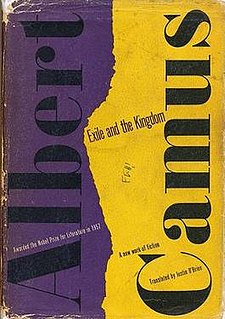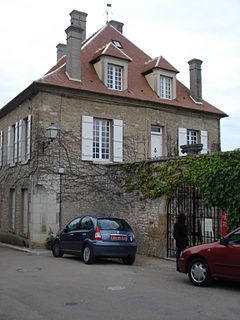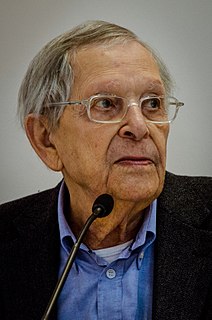
Existentialism is the philosophical study that begins with the human subject—not merely the thinking subject, but the acting, feeling, living human individual. It is associated mainly with certain 19th and 20th-century European philosophers who, despite profound doctrinal differences, shared the belief in that beginning of philosophical thinking.

The Myth of Sisyphus is a 1942 philosophical essay by Albert Camus. The English translation by Justin O'Brien was first published in 1955.

In philosophy, "the Absurd" refers to the conflict between the human tendency to seek inherent value and meaning in life and the human inability to find any in a purposeless, meaningless or chaotic and irrational universe. The universe and the human mind do not each separately cause the Absurd, but rather, the Absurd arises by the contradictory nature of the two existing simultaneously.

Exile and the Kingdom is a 1957 collection of six short stories by French writer Albert Camus.

Mohammed Dib was an Algerian author. He wrote over 30 novels, as well as numerous short stories, poems, and children's literature in the French language. He is probably Algeria's most prolific and well-known writer. His work covers the breadth of 20th century Algerian history, focusing on Algeria's fight for independence.

Resistance, Rebellion, and Death is a 1960 collection of essays written by Albert Camus and selected by the author prior to his death. The essays here generally involve conflicts near the Mediterranean, with an emphasis on his home country Algeria, and on the Algerian War of Independence in particular. He also criticizes capital punishment and totalitarianism in particular.
Jacques Lacarrière was a French writer, born in Limoges. He studied moral philosophy, classical literature, and Hindu philosophy and literature. Professionally, he was known as a prominent critic, journalist, and essayist.
Les Temps modernes is a French journal, founded by Simone de Beauvoir and Jean-Paul Sartre. It first issue was published in October 1945. It was named after a film by Charlie Chaplin.
Pascal Pia, born Pierre Durand, was a French writer, journalist, illustrator and scholar. He also used the pseudonyms Pascal Rose, Pascal Fely and others.
Jean Pélégri was a writer and professor of literature. Of French descent, he was born in Algeria, but left as part of the diaspora of French colonists referred to as pied-noirs following the Algerian War.
Jean Sénac was an Algerian author. Born of an unknown father in Béni Saf in the Oran region of Algeria, the "poet who signed with a sun", was murdered in Algiers on August 30, 1973. His murder remains unsolved. Besides his poems and writings, he was renowned for a long-running relationship and correspondences with Albert Camus. A portion of his papers are stored at the City Archives in Marseille, France.
"Reflections on the Guillotine" is an extended essay written in 1957 by Albert Camus. In the essay Camus takes an uncompromising position for the abolition of the death penalty. Camus's view is similar to that of Cesare Beccaria and the Marquis de Sade, the latter having also argued that murder premeditated and carried out by the state was the worst kind. Camus states that he does not base his argument on sympathy for the convicted but on logical grounds and on proven statistics. Camus also argues that capital punishment is an easy option for the government where remedy and reform may be possible.

Abd al Malik, born Régis Fayette-Mikano, is a French rapper and spoken word artist of Congolese origin. He has also authored books in French, and directed a film adaptation of one of his books.

Jules Roy was a French writer. "Prolific and polemical" Roy, born an Algerian pied noir and sent to a Roman Catholic seminary, used his experiences in the French colony and during his service in the Royal Air Force during the Second World War as inspiration for a number of his works. He began writing in 1946, while still serving in the military, and continued to publish fiction and historical works after his resignation in 1953 in protest of the First Indochina War. He was an outspoken critic of French colonialism and the Algerian War of Independence and later civil war, as well as a strongly religious man.

Michel Brault, OQ was a Canadian cinematographer, cameraman, film director, screenwriter, and film producer. He was a leading figure of Direct Cinema, characteristic of the French branch of the National Film Board of Canada in the 1960s. Brault was a pioneer of the hand-held camera aesthetic.
Marcel J. Melançon is a Canadian philosopher and scientist. He was born in Saint-Barnabé, Quebec, in 1938, and is mostly known for his book on the French philosopher Albert Camus Albert Camus, An Analysis of his thought. He has mostly worked together with the biologist Richard D. Lambert.

Georges Toussaint Léon Palante was a French philosopher and sociologist.
Jean Grenier was a French philosopher and writer. He taught for a time in Algiers, where he became a significant influence on the young Albert Camus.

Roger Grenier was a French writer, journalist and radio animator. He was Regent of the Collège de ’Pataphysique.











